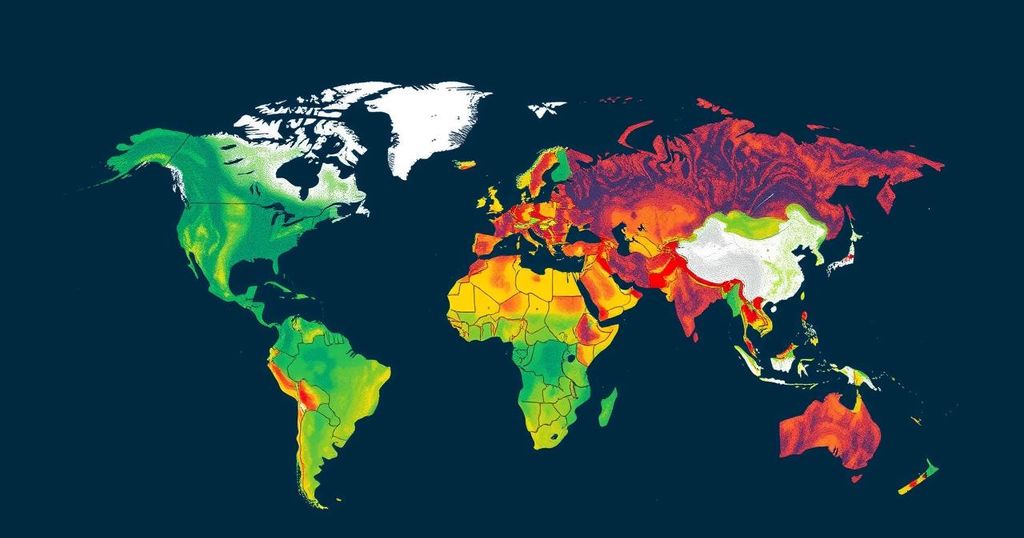Climate change
AFRICA, ANNE WITKOWSKY, BUREAU OF CONFLICT AND STABILIZATION OPERATIONS, CLIMATE, CLIMATE CHANGE, EAST PROGRAM POLAR INSTITUTE, ENVIRONMENT, GOODMAN, INTERNATIONAL COOPERATION, MER, MERISSA KHURMA, MIDDLE EAST, PETER SCHWARTZSTEIN, POLAR INSTITUTE, SUSTAINABILITY, US, US DEPARTMENT OF STATE
Marcus Li
0 Comments
The Intersection of Climate Change and U.S. Foreign Policy: Insights on Climate Security
The Wilson Center, in partnership with the Center for Climate & Security, hosted a dialogue on October 1 focusing on climate security and its implications for U.S. foreign policy. Key experts, including Sherri Goodman and Peter Schwartzstein, discussed the increasing risks posed by climate change on global stability and the need for collaborative responses. This event highlighted the linkage between climate initiatives and conflict resolution, informed by the upcoming publications detailing these themes.
In an era marked by unprecedented climate challenges, record-breaking heat waves, floods, and socio-economic disparities are severely undermining community resilience and escalating conflict risks. As countries worldwide embark on an ambitious energy transition initiative, they also grapple with the emerging geopolitical implications tied to these environmental changes. Therefore, understanding the intricate relationship between climate change, peace, and security has emerged as a pivotal area of focus within international relations, demonstrated through initiatives like the COP28 Declaration on Climate, Relief, Recovery, and Peace. On October 1, the Wilson Center, in collaboration with the Center for Climate & Security, facilitated a critical dialogue featuring prominent figures in the field of climate security. Sherri Goodman, an esteemed author and expert in climate security, joined environmental journalist Peter Schwartzstein, Middle East specialist Merissa Khurma, and Anne Witkowsky, the Assistant Secretary for the Bureau of Conflict and Stabilization Operations at the U.S. Department of State. The panel discussed the implications of climate change on global security risks, the evolving stance of the United States regarding climate security, and potential collaborations to promote stability through climate initiatives. The conversation was enriched by insights from two forthcoming books: Sherri Goodman’s “Threat Multiplier: Climate, Military Leadership, and the Fight for Global Security,” set to release in 2024, and Peter Schwartzstein’s “The Heat and the Fury: On the Frontlines of Climate Violence.” These works aim to articulate the pressing need for a comprehensive approach to mitigating climate-induced conflicts and fostering international cooperation.
The intersection of climate change and security has gained increasing attention on the global stage, largely due to the growing evidence that climate-related events can exacerbate existing socio-economic tensions and lead to violent conflict. Heat waves and flooding not only threaten the fundamental living conditions of affected communities but also disproportionately impact vulnerable populations, deepening existing inequalities. In this context, countries are recognizing the need for a coordinated response, which has culminated in various international agreements aimed at addressing these multifaceted challenges. The COP28 Declaration underscores the urgency of integrating climate considerations into peace-building and stabilization efforts, thereby influencing national foreign policies, particularly that of the United States. The upcoming discussions and publications from experts in the field serve as a critical foundation for developing a more resilient global strategy against climate-induced violence.
The dialogue hosted by the Wilson Center highlights the urgent necessity to address the impacts of climate change on global security through a multi-faceted approach. The experts emphasized the role of proactive climate policies not only in mitigating the effects of environmental degradation but also in fostering international cooperation and stability. As the geopolitical landscape evolves in response to climate stressors, the United States and other nations must prioritize climate security within their foreign policy frameworks to effectively tackle the complexities of both climate change and conflict resolution. The insights derived from the forthcoming literature further accentuate the critical nexus of climate, security, and proactive leadership in our collective fight for a stable future.
Original Source: www.wilsoncenter.org




Post Comment